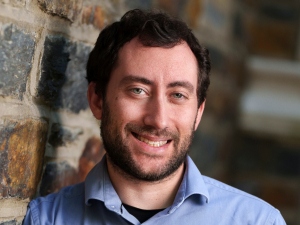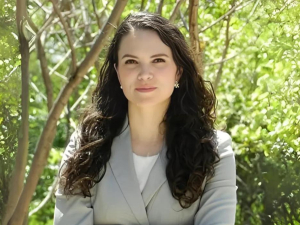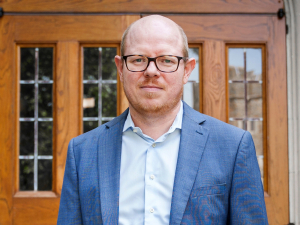
Duke Economics’ New Faculty Trifecta Expands Research Horizons
Three new faculty members joining Duke Economics this fall have one important trait in common: enthusiasm for the department’s strong commitment to interdisciplinary collaboration.
Their diverse expertise will expand the department’s research capabilities, bringing new insights into areas like education and social policy, gender and labor force dynamics, and climate change policy. With a collective focus on cross-disciplinary approaches, Michael Dinerstein, Alessandra González and Felix Tintelnot will enrich the department's academic environment and foster solutions to pressing global challenges.
Education as a Market
In graduate school, Michael Dinerstein was introduced to industrial organization, a field that examines the interaction between markets and competition. He’d always been interested in education and social policy, and he realized there was a need for more research in education economics.
“I’m bringing the study of the markets to education,” says Dinerstein, “and thinking about how schools compete for students and teachers. I look at how that competition — or lack of competition — shapes education policy.”
Dinerstein also studies development economics, which focuses on how to help developing countries improve their economic conditions. Dinerstein looks at markets in Kenya where people can buy antibiotics without a prescription. This creates a market for these drugs, which in turn creates competition between the stores that sell them. “I look at the intersection of this specific market and how it applies to health policy,” he says.
The fact that he’s able to study several different fields within the discipline is what drew Dinerstein to Duke. “In my experience, Duke is unique in that they don’t just support collaboration, they encourage it,” he says. “That makes it an incredible place to work.”
Exploring Gender, Culture and Labor Market Dynamics
Alessandra González's research focuses on how cultural factors shape economic outcomes. She studies female labor force participation, the formation of labor market preferences and employer adaptation to cultural norms.
Over the last decade, González has conducted research in Saudi Arabia, researching what women's economic outcomes look like there. She’s also interested in how employers adapt to the changing labor market. Her projects examine how women are being prepared for new jobs and opportunities, and how employers adapt their own organizational culture to these new female entrants.
“As Saudi women expand into the workforce, they want what all women working with kids want, which is to have competent, affordable childcare. It’s exciting to see that becoming part of the national conversation,” González says.
She mentions that while economists have pointed out that it's taken 100 years for women in the U.S. to find some kind of balance when it comes to work and family, that balance is still not perfectly equal.
“In Saudi Arabia, these kinds of big changes have happened in the last 20 years,” says González. “They've doubled women's labor force participation and women have become the majority of college graduates in a short period. I investigate that quick cultural change and what it means for their economy.”
A native Southerner, González is excited about being in North Carolina. “I went to school in the South at Rice University, which I think is very similar to Duke. They both value liberal arts education as much as research.”
“Duke draws a nice selection of students who are very motivated, but also well-rounded,” she says. “They’re open to what life brings, so I'm excited to meet some motivated students and work with them.”
Economic Influence on Global Markets and Networks
Felix Tintelnot’s research explores the impact of trade and multinational production on consumers, workers and technology.
An international trade economist, Tintelnot studies the process of globalization and how countries integrate through the exchange of goods, people, and ideas. He uses different types of data, like retail prices, tax returns from workers and companies, and business transactions to study how multinational production and trade affect prices, jobs, and the technological growth of countries.
“It's a fascinating time to be studying something so relevant,” says Tintelnot. “You can read about the impacts of globalization in the media nearly every day. This is an active ‘economic policy’ area, where policy decisions are constantly being made.”
For example, Tintelnot is looking at the consequences of Buy American restrictions on consumer prices and the effectiveness of bringing electric vehicle programs to the United States. “Electric vehicles are a very tangible product, and we have access to great data in which we can observe nearly half of all car transaction prices in the United States,” he says. Using registration data, researchers like Tintelnot can also track the market share of each product over time. The current administration has selected the electric vehicle market as a target for industrial policy in the context of a legislation that was aimed to combat climate change. However, Tintelnot notes there can be a trade-off between industrial policy and environmental policy objectives, something he is excited to explore in more depth at Duke.
Tintelnot’s research also touches on related areas like industrial organization and economic geography, offering insights into how global markets and production networks are interconnected.
Because of the interdisciplinary nature of his work, Duke was a natural fit for the economist.
“Duke is establishing a hub of people with interest in trade and supply chains,” says Tintelnot. “It’s becoming a go-to place to study these topics. We don’t just need good people in our area, we need good people in other fields as well, and that’s what Duke is doing.”
Strengthening Partnerships
Duke Economics’ goal was to seek out a new cohort of scholars who could expand the department's research into new and exciting areas while also forming meaningful connections with the existing faculty.
“We are thrilled about Felix, Michael and Alessandra joining the department,” said Professor of Economics and department chair James Roberts. “Each of them works at the intersection of a variety of subfields within the discipline, and as such, they will each expand our research and teaching capabilities in important and exciting ways.”



